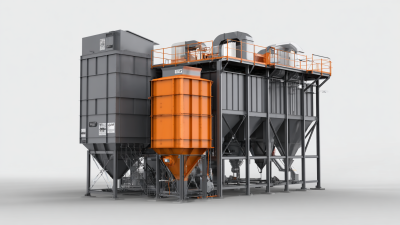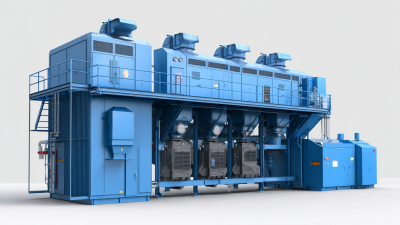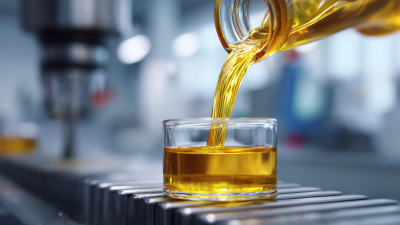How to Choose the Right Elmo Rietschle Vacuum Pump Lubricant for Your Needs
Table of Contents
- Understanding the Different Types of Elmo Rietschle Vacuum Pump Lubricants
- Evaluating Viscosity Levels for Optimal Pump Performance and Longevity
- Assessing the Impact of Temperature Range on Lubricant Selection
- Examining Compatibility with Pump Materials to Prevent Failures
- Analyzing Industry Standards for Lubricants in Vacuum Pump Applications
- Calculating Cost-Effectiveness: Balancing Quality and Budget Constraints
- FAQS
- Conclusion
- Related Posts
Picking the right Elmo Rietschle Vacuum Pump Lubricant is pretty important if you want your equipment to run smoothly and last longer. I mean, according to industry reports, using the wrong lubricant can really hurt efficiency—up to 30% of downtime can actually be caused by lubricant stuff going wrong. Over here at Shanghai Jiongcheng Industrial Co., Ltd., we’ve got your back with all things lubrication. Whether it's compressor lubricants or custom-made vacuum pump lubricants, we’ve got a full lineup that fits the bill. Our cutting-edge research and manufacturing tech make sure our Elmo Rietschle Vacuum Pump Lubricant handles high-temperature needs like a champ. Plus, our labs run thorough quality checks so you can count on top performance every time. Choosing the right lubricant doesn’t just make your machine more reliable—it also helps you stay compliant with industry standards, which ultimately means better efficiency and savings for your operations.

Understanding the Different Types of Elmo Rietschle Vacuum Pump Lubricants
When you're choosing the right lubricant for your Elmo Rietschle vacuum pump, it's pretty important to get a good handle on the different types out there. Each one is designed for specific uses and environments, so understanding these differences can save you a lot of hassle. Usually, you'll find lubricants falling into three main categories: mineral oils, synthetic oils, and biodegradable options. Interestingly, a 2021 industry report mentioned that synthetic lubricants can last up to 30% longer than traditional mineral oils. That makes them a smart, cost-effective choice—especially in demanding setups.
A quick tip: Think about the operating temperature and environment before picking your lubricant. For example, synthetic ones tend to perform better in really hot or cold conditions, while biodegradable oils are great if your industry needs to stick to strict environmental rules.
Also, keep in mind what kind of pump you're dealing with—whether it’s a rotary vane or a dry vacuum pump. According to a study from Vacuum Technology Review, using the wrong lubricant can cut down your pump’s efficiency by about 15%. So, knowing your specific application helps you pick the right lube. That way, your pump runs smoothly and you avoid unnecessary downtime.
Elmo Rietschle Vacuum Pump Lubricant Types Comparison
Evaluating Viscosity Levels for Optimal Pump Performance and Longevity
When you're picking the right vacuum pump lubricant for your Elmo Rietschle pumps, it really pays to pay attention to viscosity. I mean, this is a key factor in making sure everything runs smoothly and the pump lasts longer. Basically, viscosity determines how thick that lubricating film is—something pretty important because it helps cut down on friction and wear inside those pump parts. If you get the viscosity just right, the lubricant will do its job well no matter if the temperature or pressure changes, which means less risk of your pump breaking down early. So, it's a good idea to double-check the manufacturer’s recommendations and do a thorough evaluation to pick a lubricant that fits the specific needs of your setup.
On a broader note, newer methods for checking how well maintenance actually works—like using 'risk curves'—are showing us just how crucial choosing the right lubricant really is for industrial equipment. These tools help quantify how much proper maintenance impacts the health of your machines — basically, if you use the wrong lubricant, you might end up dealing with more breakdowns and lost time. Companies such as Shanghai Jiongcheng Industrial Co., Ltd. are really stepping up their game, offering tailored lubrication solutions backed by cutting-edge tech and strict quality control. That way, you can count on their vacuum pump lubricants to keep performing well over time, giving your whole system a boost in reliability.
Assessing the Impact of Temperature Range on Lubricant Selection
When you're choosing the right lubricant for your Elmo Rietschle vacuum pump, one thing you really wanna pay attention to is the temperature range it’ll be operating in. I mean, according to a report from the International Journal of Vacuum Science, lubricants can change quite a bit—like their viscosity and how well they perform—when temperatures fluctuate. This can actually have a pretty big impact on your pump’s efficiency and how long it lasts. So, it’s super important to pick a lubricant that matches the pump’s designed temperature range. Most of these are somewhere between -20°C to 100°C, but it really depends.

A good tip is to always double-check the manufacturer’s specs for temperature ratings. Also, think about your specific environment—do temperatures tend to swing quite a bit? Something else to keep in mind is thermal stability; some lubricants stay stable and maintain their viscosity better at higher temps, which helps prevent breakdowns and keeps things running smoothly.
Here’s the thing: if you go for a lubricant that’s not really suited for your operating temperature, you could end up with increased wear and tear—none of us want that. It can shorten your pump’s lifespan and hurt efficiency. So, take a really close look at your working conditions before you pick a lubricant, and don’t forget to review the technical data sheets—they’ll tell you exactly what temperature ranges the lubricants can handle. Better safe than sorry, right?
Examining Compatibility with Pump Materials to Prevent Failures
Choosing the right lubricant for your Elmo Rietschle vacuum pump isn't just about picking any oil or grease. You really need to consider how the lubricant interacts with the pump’s materials—things like aluminum, stainless steel, or plastics. Each of these materials reacts differently to various chemicals, and using the wrong lubricant can cause all sorts of trouble—leaks, decreased performance, or even the pump breaking down completely.
To keep things running smoothly and make sure your pump lasts, it’s a good idea to check out what the manufacturer recommends. It also helps to do some compatibility tests or chat with a pump expert if you’re unsure. At the end of the day, picking the right lubricant isn’t just about avoiding problems—it’s about keeping your equipment reliable and in good shape for the long haul.
Analyzing Industry Standards for Lubricants in Vacuum Pump Applications
When you're looking into the industry standards for lubricants used in vacuum pumps, it's really important to pick the right one that ticks all the boxes—not just for the pump’s operation but also for the environment. You see, since there are different kinds of vacuum pumps out there, like dry pumps and molecular pumps, what works for one might not be suitable for the other. For example, dry vacuum pumps usually need lubricants that can handle high temps and offer great wear protection. On the flip side, molecular pumps require specialized lubricants that stay low vapor pressure and keep things running smoothly and efficiently.
So, a few tips to help you choose the right lubricant—you’ll want to check the operating temperature range of your pump, make sure the lubricant is compatible with the pump’s materials, and think about what you’re using it for—whether it’s in semiconductor manufacturing or some other industrial process. Also, it’s a good idea to chat with manufacturers who focus on lubrication solutions. They can give you insights into advanced formulas that can help your pump last longer and perform better.
And don’t forget, regular maintenance and checking your lubricants’ quality are super important. Investing in good-quality lubricants isn’t just about performance; it’s about keeping the whole system reliable, especially in critical sectors like pharma or chemical industries. By staying up-to-date with industry trends and standards, you’ll be in a better spot to make smart choices for your lubrication needs — it’s all about being informed and making the right call.
How to Choose the Right Elmo Rietschle Vacuum Pump Lubricant for Your Needs
| Lubricant Type | Viscosity (cSt) | Temperature Range (°C) | Applications | Synthetic |
|---|---|---|---|---|
| Oil-Based Lubricant | 68 | -20 to 150 | General industrial vacuum applications | No |
| Full Synthetic Lubricant | 32 | -40 to 200 | High vacuum applications, laboratories | Yes |
| Mineral Oil Lubricant | 46 | -10 to 120 | Industrial processes, general use | No |
| Bio-Based Lubricant | 68 | -20 to 150 | Eco-friendly applications | Yes |
| Vacuum Pump Oil | 150 | 0 to 180 | Heavy-duty vacuum applications | No |
Calculating Cost-Effectiveness: Balancing Quality and Budget Constraints
When you're choosing the right lubricant for your Elmo Rietschle vacuum pump, cost is definitely something you want to keep in mind. Going for a top-quality lubricant might seem like a bigger expense upfront, but it really pays off in the long run by making your equipment last longer — meaning fewer repairs and replacements down the line. Interestingly, a report from MarketsandMarkets mentions that the global vacuum pump market is expected to grow at about 5.5% annually, and one of the big drivers behind this growth is using efficient lubricants. So, finding that sweet spot between good quality and a reasonable price is pretty important if you want your vacuum systems to run smoothly and efficiently.

FAQS
: The main types of Elmo Rietschle vacuum pump lubricants include mineral oils, synthetic oils, and biodegradable options.
Synthetic lubricants have been reported to provide up to 30% longer operational life compared to traditional mineral oils, making them a more economical choice for high-demand environments.
Lubricants can undergo significant changes in viscosity and performance at varying temperatures, impacting the efficiency and longevity of the vacuum pump. It is important to match the lubricant's operational temperature with that of the pump's designed range.
Always check the manufacturer's specifications for temperature ratings and consider how ambient conditions can change in your application to select a suitable lubricant.
Using the wrong lubricant can lead to a decline in pump efficiency by as much as 15%, affecting overall performance and increasing downtime.
Most lubricants are designed to operate within a temperature range typically between -20°C to 100°C.
A lubricant with better thermal stability will maintain its viscosity at high temperatures, preventing degradation and enhancing the performance of the vacuum pump.
Understanding the specific application type, whether for a rotary vane pump or a dry vacuum pump, is crucial in choosing the right lubricant.
Fluctuating ambient conditions may affect the lubricant's performance, so it is essential to select one that can handle these variations appropriately.
If the operational temperature exceeds the lubricant's capability, it can lead to increased wear and tear, reducing both the efficiency and lifespan of the vacuum pump.
Conclusion
Choosing the right Elmo Rietschle Vacuum Pump Lubricant isn't just a small detail—it can make a big difference in how well your pump performs and how long it lasts. Honestly, it can get a bit confusing with all the different types out there. You’ve got to get a good handle on their viscosity levels since that really affects efficiency. Plus, don’t forget to check if the lubricant works well within the temperature range your pump will be running in—extreme heat or cold can really mess things up. It’s also super important to see if the lubricant is compatible with the materials of your pump; ignoring this could lead to failures down the line.
And of course, industry standards aren’t just boring rules—they're there to help us pick lubricants that are reliable and safe. Budget-wise, you’ll want to find that sweet spot between quality and cost—that way, you're not overspending but still getting something that works. At Shanghai Jiongcheng Industrial Co., Ltd., we know our stuff when it comes to high-performance lubricants, including Elmo Rietschle Vacuum Pump Lubricants. We’re here to offer you solutions that are tailored to your specific needs, backed by cutting-edge tech and thorough quality checks. Basically, we’re all about helping you keep your equipment running smoothly and saving you some headaches in the process.
Related Posts
-

Comprehensive Guide to Understanding the Working Principle of Cyclone Dust Collectors for Global Buyers
-

Discover Outstanding Products from China with the Best Reliant Dust Collector 720 for Global Buyers
-

Top Strategies for Choosing the Best Sunflower II Led Nail Dust Collector
-

How to Choose the Right Ingersoll Rand Lubricant for Your Equipment Needs
-

Innovative Applications of One Unit Dust Collector Together in Diverse Industries
-

Understanding the Benefits of Purified Mineral Oil in Modern Applications
Blog Tags:
